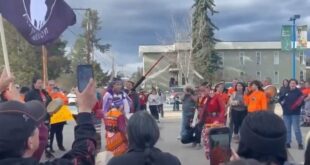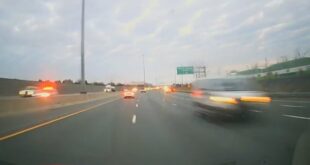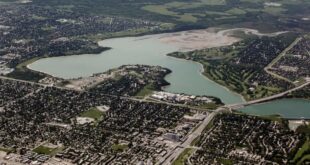Eby visiting wildfire-hit areas of Interior as flames surge again in central, northeastern parts of province

As wildfire activity increases in central British Columbia, Premier David Eby returned to one of the hardest hit areas of the province on Monday.
Eby, along with Emergency Management Minister Bowinn Ma, are visiting Kamloops and Salmon Arm in the province's southern Interior on Monday to meet those affected by this season's devastating fires.
Prior to a news conference at the airport in Kamloops, Eby announced a new task force would be struck to look at lessons learned and best practices around the response to wildfires, drought, heat, floods and other emergencies affecting the province.
"We must continually update and enhance our prevention and response measures to the near-constant series of emergencies we are facing as a result of climate change," said Eby in a statement.
The release did not say who would make up the panel or when it would be established. Eby said it would include experts but also people responding on the front lines of emergencies and perhaps people from other jurisdictions with applicable knowledge.
Eby said some of its main tasks will be to devise how best to collaborate with communities and First Nations, incorporate municipal firefighting and provide support to people who are directly affected.
Need to leverage local knowledge: Eby
One of the central conflicts this wildfire season occurred in B.C.'s Shuswap region in August when residents who defied evacuation orders to save structures criticized the province for not being nimble enough to support them.
Eby said in touring fire-affected areas this summer he has learned that efforts from people on the ground in their communities need to be part of a provincial, co-ordinated response.
"We could be doing a better job of leveraging local knowledge and expertise when it comes to preventing and fighting wildfires," he said.
The task force will also assess how to provide timely access to short-term financial supports and accommodation for residents forced to flee their homes due to evacuation orders.
"We owe it to all of those who fought the fires, left their homes behind, and opened their hearts to feed and house evacuees to find ways to support them better as climate disasters get worse and more frequent," Eby said.
Eby also promised that whatever the task force came up with would be put to use. His government has faced criticism that previous reviews of wildfire responses were not heeded, especially about recommendations over communication gaps, poor relations and co-operation with First Nations, and inadequate prevention measures.
More orders, alerts
The premier's tour comes as several evacuation alerts were expanded in the Fort St. James and Vanderhoof areas due to wildfires burning nearby.
An evacuation order was also expanded on Sunday by the Regional District of Bulkley-Nechako due to the Tatuk Lake wildfire.
The fire of note, which the B.C. Wildfire Service (BCWS) says is now 250 square kilometres in size, is burning around 100 kilometres southwest of Prince George.
Also on Sunday an evacuation order was expanded for properties in a remote area about 80 kilometres northwest of Prince George due to the Great Beaver Lake wildfire, which is now 147 square kilometres in size, according to the BCWS.
'Stay alert'
The wildfire service said Sunday that weather in the Prince George Fire Centre area, which spans the northeast quarter of the province, is expected to be warm, dry and windy.
The BCWS said strong gusts of wind are possible this week and, coupled with "persistent drought conditions,'' it expects increased wildfire activity and smoky conditions "across the region.''
"Individuals in the vicinity of existing wildfires are encouraged to stay alert and aware of the current wildfire situation as wildfires are dynamic and conditions may change rapidly,'' the BCWS said.
There are still more than 400 wildfires burning in the province and more than 22,500 square kilometres of land have burned so far in a record-breaking fire season.
<a href="https://twitter.com/hashtag/BCWildfire?src=hash&ref_src=twsrc%5Etfw">#BCWildfire</a> continues to respond to the Spetch Creek Fire, located 2km south of Owl Lake in the Pemberton Zone. A smoke column is highly visible in the area.<br>Aviation resources and 11 personnel are on scene. This fire is burning in steep terrain, resources are actioning… <a href="https://t.co/brO6coVIS5">pic.twitter.com/brO6coVIS5</a>
—@BCGovFireInfo
The provincial government says Eby and Ma will meet with residents, local authorities, volunteers and BCWS members on Monday.
In the Kamloops Fire Centre where provincial officials are visiting, more than 1,900 square kilometres have burned this season after lightning sparked blazes across the region.
Meanwhile, officials in the Okanagan Valley said Sunday that they aren't expecting to lift any evacuation orders or alerts related to the out-of-control McDougall Creek wildfire.
In an update Sunday, Central Okanagan Emergency Operations said hundreds of properties remain evacuated, including 122 in the City of West Kelowna.
Properties still under evacuation orders due to the blaze "are more remote, topographically challenging and/or close to active wildfire areas," it added.
Campfire, burning bans
BCWS information officer Shaelee Stearns said this weekend saw hotter temperatures, decreased humidity and increased fire activity.
She wants to remind people in the Kamloops Fire Centre area, which covers much of the central southern Interior, that there is currently a complete prohibition on campfires and open burning.
"It's important people for just to be aware of that," she said. "If you do see someone having a campfire, you can report it, it's beneficial. Just make sure everyone's practising caution as we go. We're still into these warmer temperatures."
Meanwhile, B.C. Hydro crews are still working to replace more than 400 power poles and other infrastructure damaged by flames, including 27 kilometres of power lines and dozens of pieces of equipment.
A statement from the power authority said other efforts are underway to make evacuated areas safe to return to, including restoring gas and water services, and removing problem trees and other hazards.
With files from the Canadian Press and Michelle Gomez
*****
Credit belongs to : www.cbc.ca
 MaharlikaNews | Canada Leading Online Filipino Newspaper Portal The No. 1 most engaged information website for Filipino – Canadian in Canada. MaharlikaNews.com received almost a quarter a million visitors in 2020.
MaharlikaNews | Canada Leading Online Filipino Newspaper Portal The No. 1 most engaged information website for Filipino – Canadian in Canada. MaharlikaNews.com received almost a quarter a million visitors in 2020.







